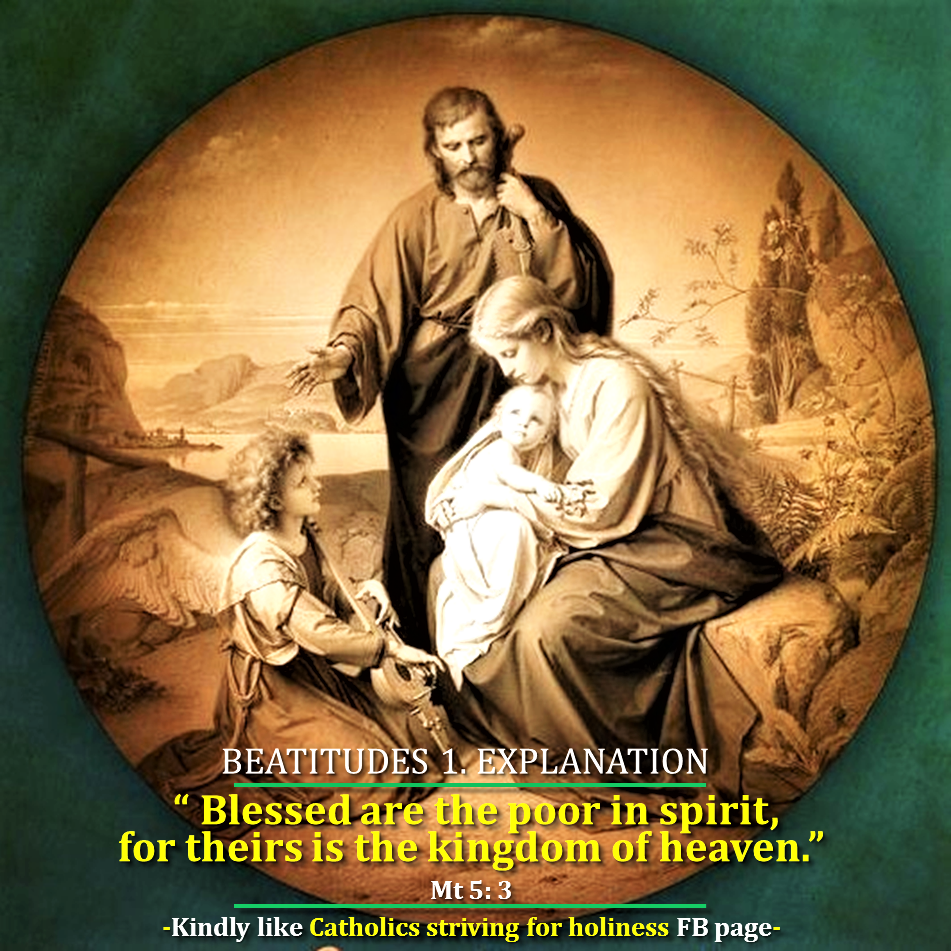BEATITUDES 1:
WHAT DOES “POOR IN SPIRIT” MEAN?

The Commentary to the Gospel of St. Matthew (Navarre Bible) explains that: “This text outlines the connection between poverty and the soul.
- This religious concept of poverty was deeply rooted in the Old Testament (cf., for example, Zeph 2:311). It was more to do with a RELIGIOUS ATTITUDE OF NEEDINESS AND OF HUMILITY TOWARDS GOD THAN WITH MATERIAL POVERTY: that person is poor who has recourse to God without relying on his own merits and who trusts in God’s mercy to be saved.
- This religious attitude of poverty is closely related to what is called “SPIRITUAL CHILDHOOD”. A Christian sees himself as a little child in the presence of God, a child who owns nothing: everything he has comes from God and belongs to God. Certainly, spiritual poverty, that is, Christian poverty, means one must be detached from material things and practise austerity in using them. God asks certain people — religious — to be legally detached from ownership and thereby bear witness to others of the transitoriness of earthly things.”
Pope Francis, in his Apostolic Exortation, Gaudete et exultate, nos. 67-70 comments:
“Blessed are the poor in spirit, for theirs is the kingdom of heaven”
- 67. The Gospel invites us to peer into the depths of our heart, to see where we find our security in life. Usually the rich feel secure in their wealth, and think that, if that wealth is threatened, the whole meaning of their earthly life can collapse. Jesus himself tells us this in the parable of the rich fool: he speaks of a man who was sure of himself, yet foolish, for it did not dawn on him that he might die that very day (cf. Lk 12:16-21).
- 68. Wealth ensures nothing. Indeed, once we think we are rich, we can become so self-satisfied that we leave no room for God’s word, for the love of our brothers and sisters, or for the enjoyment of the most important things in life. In this way, we miss out on the greatest treasure of all. That is why Jesus calls blessed those who are poor in spirit, those who have a poor heart, for there the Lord can enter with his perennial newness.
- 69. This spiritual poverty is closely linked to what Saint Ignatius of Loyola calls “holy indifference”, which brings us to a radiant interior freedom: “We need to train ourselves to be indifferent in our attitude to all created things, in all that is permitted to our free will and not forbidden; so that on our part, we do not set our hearts on good health rather than bad, riches rather than poverty, honour rather than dishonour, a long life rather than a short one, and so in all the rest”.[68]
- 70. Luke does not speak of poverty “of spirit” but simply of those who are “poor” (cf. Lk 6:20). In this way, he too invites us to live a plain and austere life. He calls us to share in the life of those most in need, the life lived by the Apostles, and ultimately to configure ourselves to Jesus who, though rich, “made himself poor” (2 Cor 8:9).
- Being poor of heart: that is holiness.
Cordially inviting you to like our FB page so we could have a wider apostolic reach and help more people in their Christian life. Thanks and God bless! Fr. Rolly Arjonillo.
SEE AS WELL :
THE BEATITUDES AND HOLINESS. AV reflection in https://catholicsstrivingforholiness.org/4th-sunday-o-t-a-the-beatitudes-a-way-of-holiness-and-happiness-av-catechism-gospel-reflection/
THE BEATITUDES. AV Catechism in https://catholicsstrivingforholiness.org/4th-sunday-ot-a-the-beatitudes-and-holiness-av-reflection/
Stay updated: subscribe by email for free TO OUR NEW WEBSITE www.catholicsstrivingforholiness.org (PUT YOUR EMAIL IN THE SUBSCRIBE WIDGET).
We are also in www.fb.com/Catholicsstrivingforholiness. Kindly help more people in their Christian life by liking our page and inviting your family, friends and relatives to do so as well. Thanks in advance and God bless you and your loved ones! Fr. Rolly Arjonillo
